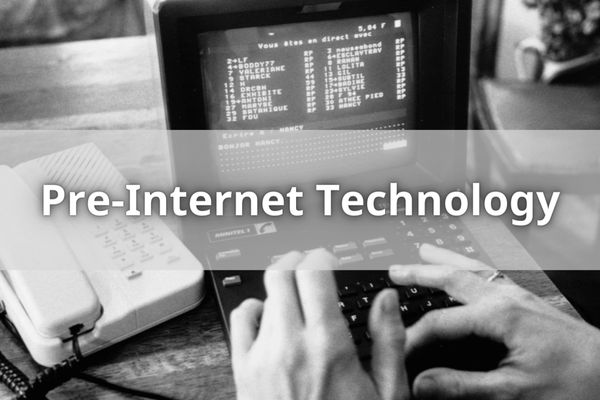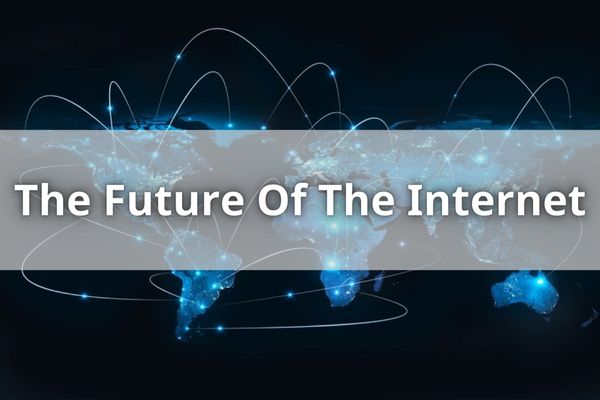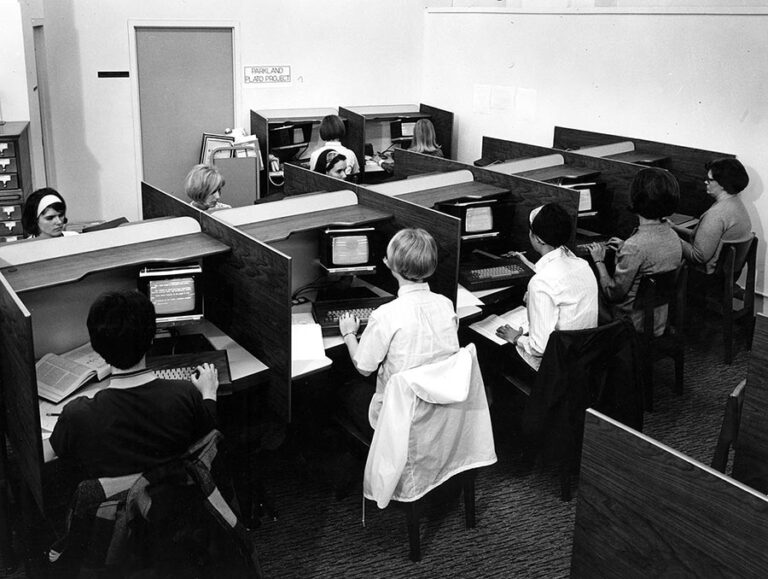The Emergence Of The Internet: Brief History Of The Internet
The Emergence Of The Internet. Hey everyone! You are all probably familiar with the internet and its applications. However, have you ever considered how it came to be?
We’ll go into the intriguing background of the internet’s development in this post. We’ll explore key moments in time that led up to today’s world-wide web. Get ready to take a journey through tech history and see just how far we’ve come!
Pre-Internet Technology

Before the internet, there were various forms of communication that laid the foundation for its development. The first step was taken by Bolt Beranek and Newman Inc (BBN) in 1969 when they developed ARPANET (Advanced Research Projects Agency Network).
This system allowed computers to communicate with each other via a language protocol called TCP/IP (Transmission Control Protocol/Internet Protocol), which is still used today. Shortly after this breakthrough, in 1974, the National Science Foundation established grants for computer science research.
This enabled universities across America to develop their own networks and connect them together using early versions of TCP/IP. It also provided funding for further networking projects such as SATNET and CSNET. The rise of these technologies greatly increased our ability to share information across vast distances, paving the way for more advanced developments like the emergence of the internet itself.
With all these pieces in place, it was only a matter of time before we saw what would become one of the most revolutionary inventions ever made: The Internet. However, how did it happen? Let’s examine some significant instances in its early development to find the answer to this issue.
Origins Of The Internet
When talking about the origins of the internet and its early development, I was intrigued by the emergence of the internet in the late 1960s.
It all began when computer scientist Vint Cerf and electrical engineer Bob Kahn developed Transmission Control Protocol (TCP) and Internet Protocol (IP).
These protocols enabled packet switching, which meant that data could be broken into small packets, sent over a network, then reassembled at its destination. The National Science Foundation created the Network Information Center to help coordinate communication between networks.
The Interface Message Processor (IMP) became the first router for this new system of inter-connectivity. It allowed multiple computers from different locations to connect with each other through one IMP – thus forming an early version of today’s internet. By connecting these networks, people were able to share information more easily than ever before – it was an exciting time!
The Invention Of the Internet And The World Wide Web
I remember the days when information seemed so inaccessible. There was no way to put it together since it resembled a huge jigsaw with strewn-about bits.
Tim Berners-Lee, who created the world wide web, altered everything after that. He developed DNS (Domain Name System) which resolved addresses of computers connected to the internet and HyperText Markup Language for creating websites. He also wrote WorldWideWeb, the first browser that could view websites as we know them today.
His contribution revolutionized computer science and gave us access to an immense amount of knowledge at our fingertips. Thanks to his innovation, I can now communicate with friends from around the globe and easily find almost any information I need online in seconds.
With such capabilities available, one can only imagine what comes next! As technology continues to evolve, let’s explore how its presence has expanded beyond what anyone expected.
The Growth Of The Internet
You’ve probably all heard of the internet, but do you know how it evolved into the tool that we use today? I’ll walk you through how the internet has grown and affected our lives in this part.
The expansion of the internet began with network packet switching. This technology allowed data to be broken down into small units called packets. Each packet could then be sent individually on a local area network (LAN) or wide area network (WAN). The packets were then reassembled at their destination. This was significant because it made communication faster and more reliable than traditional circuit-switching methods.
Additionally, IP addresses enabled individual computers to connect to each other across different networks regardless of their location, allowing for even larger scale networking capabilities.
Internet service providers (ISPs) also significantly contributed to making the internet more accessible by giving customers connections from their homes or places of business to distant servers hosting websites and apps online. ISPs not only provided these services, but they also developed technology that made it easier for users to look up information on a variety of websites and connect with others via email, social media, etc.
All of this led to an explosion in the popularity and usage of the internet which ultimately propelled us forward into where we are today – A world connected by one global digital network!
As technology advanced so too did its implications for society – both positive and negative – ushering us towards a new era; one marked by rapid change and innovation…
The Dot-Com Bubble And Crash

The expansion of the internet was just the beginning. With the creation of web browsers like Netscape and a domain name system, it revolutionized communication between computers and allowed for an easier exploration of online content. Since the Internet Engineering Task Force (IETF) created an open-source Internet architecture in 1990, anybody with a computer linked to the network may access information from anywhere in the globe.
It wasn’t long before technology companies saw potential in this new form of media and tried to capitalize on its growth with investments. The impact of the dot-com bubble on the internet began when investors started pouring money into tech startups, hoping to get huge returns quickly. They drove up stock prices without considering whether or not those businesses were sustainable over time because there seemed to be limitless possibilities within this space.
Unfortunately, most of these companies weren’t profitable and all collapsed during what became known as “the Dot-Com Crash” in early 2000s.
Nowadays, we are living in a digital age where social media and online connectivity play essential roles our lives. From being able to connect with friends across oceans through messaging apps to having almost any type of knowledge at your fingertips — one thing is certain: the internet has come a long way since its inception and will continue growing exponentially for years to come.
Social Media And Online Connectivity
I was born in the late 90s, just as the internet started to gain traction and become central to our lives. Back then, it seemed like a miracle that anyone could connect with another person from thousands of miles away at any time they wanted. Now I want to talk about The Emergence Of Social Media And Its Impact On The Internet.
As more and more people began using the internet, social media platforms formed to make online connectivity even easier. Nowadays, we can’t imagine our lives without all these internet-based services available anytime.
The emergence of the internet changed how humans interact and communicate with one another beyond recognition. We are now becoming increasingly reliant on technology and data sharing for everything from work to entertainment. Social networks have also enabled us to build meaningful connections with friends living far away and reunite families separated by long distances.
Although the advent of the internet created a whole new universe of possibilities, it also brought with it a number of problems, including cyberbullying, surveillance capitalism, and information overload. Even if the cost-benefit analysis is still up for dispute, it is safe to assume that life before the internet would have been very different from what it is now.
Let’s look more closely at how e-commerce platforms have changed through time now that we have this insight.
E-Commerce Platforms
We can all recall the excitement of finally being able to access the internet in the dial-up era. The invention of the Internet, which has allowed us to stay in touch with friends and family no matter where they may be on the planet, access a wealth of knowledge at any time, and even make purchases without ever leaving the comfort of our homes, has completely changed our lives.
This is now possible because to advancements like the Internet Protocol (IP), which enables computer communication via a computer network, the development of local area networks that encompass the Internet, and the emergence of numerous varieties of Internet Service Providers (ISPs).
The spread of e-commerce platforms, however, is what really changed things for consumers around the globe. For instance, Amazon provides customers with an extensive selection of items that can be delivered straight to their doorsteps within 24 hours—something unheard of before this technology existed. And eBay allows shoppers from all corners of the world to find items they’d never have access to otherwise. These are just some examples that demonstrate how much easier shopping has become since these online marketplaces emerged on the scene.
Additionally, consumers may effortlessly and swiftly make purchases while using mobile apps when they’re on the road. With so many alternatives now, it’s easy to discover what you need whether you want to use apps or browse websites. There is something out there for everyone who wants to buy online.
Now let’s explore how online gaming and entertainment have evolved thanks to modern technology.
Online Gaming And Entertainment
After talking about how e-commerce platforms have grown, it’s time to address how the internet has also altered the entertainment industry.
With technologies like Spotify and YouTube giving millions of people access to nearly endless amounts of music and movies, audio and video streaming services have grown in popularity over the past few years. With unparalleled access to a massive collection of information that we can enjoy from any device linked to the internet, this has fundamentally altered our relationship with audio and visual media.
The growth of online gaming too is one of the most exciting developments enabled by the internet and world wide web. MMORPGs (massively multiplayer online roleplaying games) such as World of Warcraft are now enjoyed by tens of millions across multiple platforms; creating virtual worlds where players can interact with each other through an immersive game experience like never before seen in human history.
The future promises even more possibilities as technological advances drive further progress in this field.
What all these advancements suggest is that when it comes to internet technology, there are no limits on what can be achieved if imagination meets opportunity.
With mobile devices becoming ever more powerful, many believe that new frontiers await which will transform not only how we entertain ourselves but also how we live our lives in general. As we march forward into a digital age, let us remain open minded about what lies ahead for the future of the internet.
Mobile Internet

My, how times have changed! It wasn’t so long ago that internet access seemed like a distant dream. Today, however, the majority of us enjoy easy and effortless internet access right at our fingertips – literally!
Mobile Internet has revolutionized the way we communicate and receive information with its ability to provide wireless and remote connection through telephone lines, modem or satellite technologies. Cell phone users no longer have to be constrained by their devices’ capabilities; they can now access email accounts, bank websites, social media sites, and even stream films while on the go.
Mobile technology’s advent was revolutionary because it made it possible for individuals to stay connected wherever they were. Businesses suddenly had access to a completely new market and could reach a worldwide audience without making significant investments in conventional modes of advertising. Online purchasing is now easier than ever thanks to the rise of mobile internet.
Businesses no longer require physical storefronts to conduct business since clients can easily make purchases directly from their smartphones or tablets. With this newfound freedom comes greater responsibility: consumers must take steps to protect themselves against fraudulent activity while simultaneously being mindful about data usage limits associated with certain plans.
As we continue to witness remarkable advancements in technology, the possibilities become increasingly endless – especially when it comes to video streaming services. From accessing movies anytime anywhere to experiencing live events across multiple devices, these platforms offer unprecedented convenience and flexibility…
Video Streaming Services
Since the dawn of the mobile internet, our lives have been revolutionized. We now have access to a protocol suite that facilitates communication between our computers and other devices over an interface message processor network.
This has allowed us to keep up with trends in new technologies as well as engage in activities like video streaming services anytime, anywhere.
One of the most widely used internet apps nowadays is video streaming. Using these services eliminates the need to download files or wait for downloads to complete in order to watch movies, television episodes, and sporting events.
Furthermore, they offer a variety of options for customization such as creating playlists and tracking favorites from any device connected to the internet.
These advantages make video streaming services more desirable than traditional television viewing experiences. As this technology continues to develop, we can expect it will become even easier for people around the world to access their favorite entertainment on demand at any time.
With these changes come huge opportunities for business owners looking to capitalize on these advances in technology.
The Impact Of The Internet On Business

It’s incredible to consider how much the internet has altered our lives! From its modest origins as a US government-funded research initiative in the late 1960s, it today has an impact on almost every sphere of society.
Let’s examine its brief development and history, as well as how it has affected business.
ARPANET (Advanced Research Projects Agency Network), which was primarily created for military communications, marked the beginning of the internet. This consisted of four computers connected together using a protocol called NCP (Network Control Protocol).
In 1972, NCP was replaced with TCP/IP (Transmission Control Protocol/Internet Protocol) which allowed more than just four computers to be interconnected via networks across America.
In 1983 NSFNET (National Science Foundation Network) was created and became the foundation for today’s internet infrastructure. With this new network in place, companies could use online tools like e-commerce platforms, websites, email, and other technology to simplify operations, enhance customer relations, and boost profitability.
After that, let’s examine what sort of influence this amazing technology has had on society.
The Impact Of The Internet On Society
The emergence of the internet was a pivotal moment in history. In 1983, Paul Mockapetris invented the Internet Protocol (IP) address which allowed computers to communicate with each other across networks worldwide. This enabled the development of NSFNET, or National Science Foundation Network, and began the rise of our modern World Wide Web as we know it today.
The birth of this technology led to the formation of the Internet Working Group which opened up an entirely new world of communication opportunities for anyone with access to a computer. This revolutionized how people communicated, interacted and shared information online. It created unprecedented access to knowledge that had never been available before.
Businesses were able to reach more customers than ever before while individuals could connect with family members, friends and strangers from anywhere around the globe instantly. The power of connection held by this invention changed society forever at its very core – personal relationships deepened through long distance connections while professional ones grew exponentially due to increased global accessibility.
The success of these first steps towards what would become known as ‘the internet’ marked an important chapter in history and set off a wave of innovation that continues until present day. Its impact on society has been far reaching and profound, transforming many aspects of life as we know it now; From virtual classrooms that allow students all over the world to attend lectures remotely to online banking services enabling users to manage their finances without leaving home – this digital age has given us so much convenience that most cannot imagine living without it…
The Future Of The Internet

The internet has come a long way since its development in the 1960s. It all started from an experiment conducted by the Stanford Research Institute, which resulted in the first two computers being connected to each other and thus forming the basis of what we now call ‘the internet’.
Since then, technology has advanced so much that it is now possible for us to be connected with anybody around the world at any point of time.
The current version of the internet is vastly different from its origin as it uses Transmission Control Protocol (TCP) for packet network interconnection instead of connecting through ARPANET or NFSNET. This implies that individuals may interact with others and get information more quickly than ever before, regardless of where they are physically located. Furthermore, compared to only a few years ago, data transmission speeds have increased tremendously because to innovations like 5G.
With new technological advancements on the horizon, there are many possibilities ahead for how this powerful tool will evolve further:
- Allowing users to transfer large amounts of data quickly and safely
- Enhancing devices with AI capabilities that will allow them to communicate with each other
- Increasing security protocols so personal data remains safe across networks
It’s clear that these changes are already taking shape today and they’ll continue to reshape our lives in unimaginable ways moving forward.
Conclusion: The Emergence Of The Internet
In conclusion, the internet has fundamentally altered the way that people interact and do business. It is a strong instrument that has both positive and terrible uses. As a result, it’s crucial to comprehend the security hazards connected to internet usage as well as the distinctions between the internet, intranet, and world wide web.
With this understanding, companies may more effectively and safely take advantage of the internet’s potential.
I believe that with time and continued effort from all involved parties, we will see even more exciting changes brought about by advances in technology and use of the internet.







